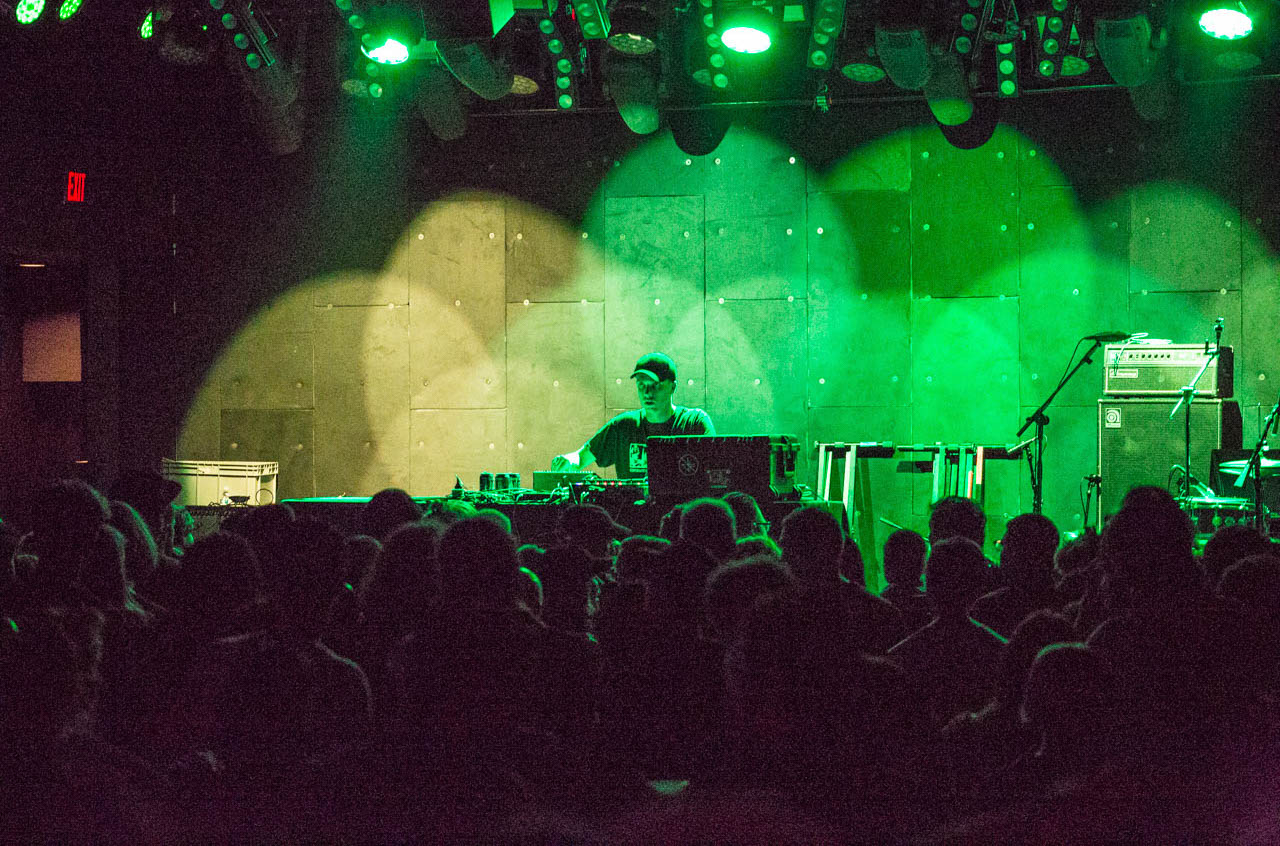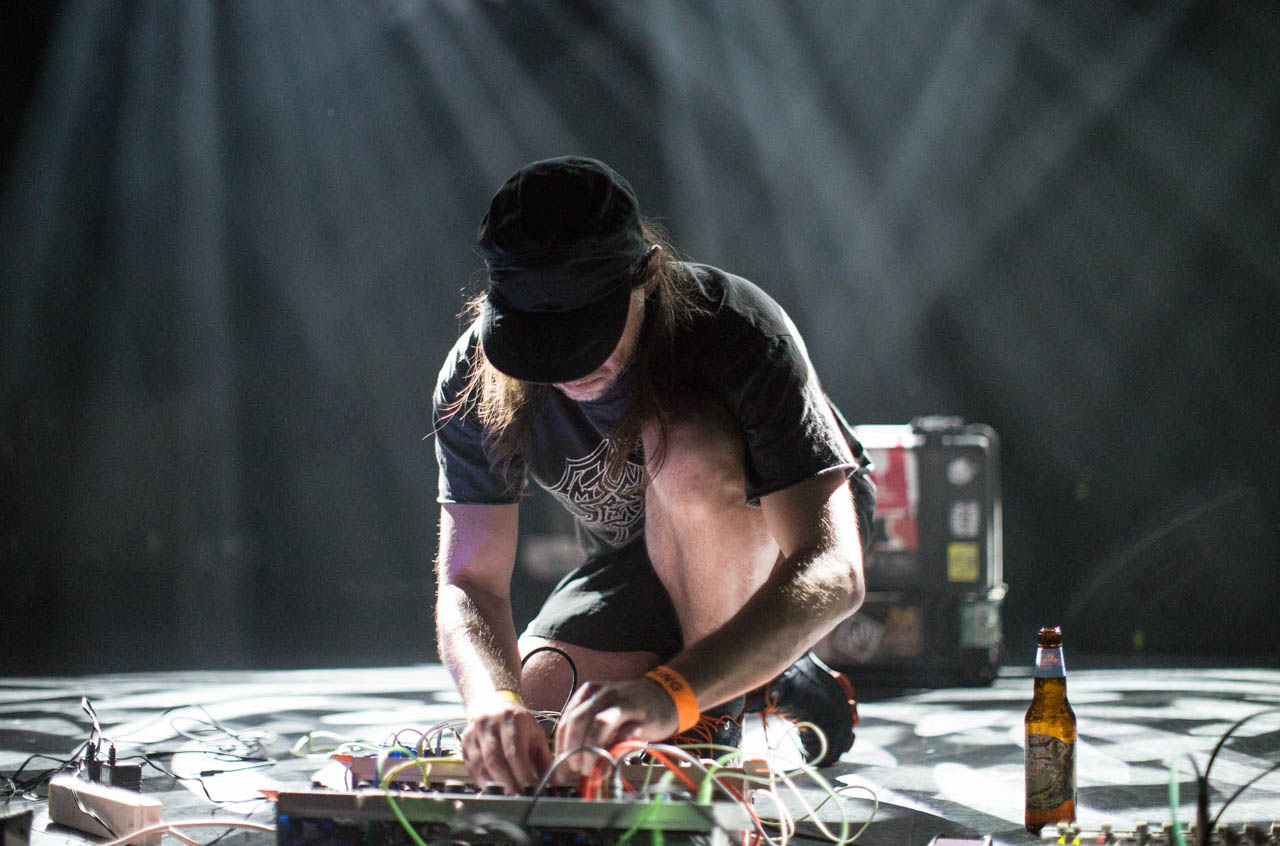- On the third day of Berserktown, the annual LA festival dedicated to scummy music of all varieties, an employee of The Teragram Ballroom ventured onstage while New York deathrock band Anasazi was playing. The band, in his opinion, was playing too loud, so he turned down the guitarist's amplifier. At that point, the band's singer punched the soundman and threw a chair and monitors into the audience. The staff, feeling threatened by this behavior, cancelled the show, forcing it to relocate to Mid-City venue UNION. Just a couple days earlier, on day one of the festival (also at Teragram, when programming was nominally dedicated to electronic acts), audience members discovered Inga Copeland and Rezzett had pulled out the day of their scheduled performance. Still, despite what can only be described as serious issues, I'd call Berserktown a success.
When I caught Christian Marclay's 24-hour film installation The Clock, it was tough to assess critically. The epic collage pulls scenes from existing movies, finding sections displaying a clock for every minute of the day. There's nothing like The Clock, so there is nothing to compare it to. The same goes for Berserktown. Though the programming for Berserktown is influenced by festivals like Berlin Atonal, Unsound and the defunct Chaos In Tejas, there is no other event that places Powell on the same bill as the nihilistic Swedish noise rock band Brainbombs, with separate afterparty options for dance, punk and black metal fans.
Berserktown is the brainchild of Graeme Flegenheimer, a Vermont native who has acted as a remarkable supporter of esoteric crews like Copenhagen's Posh Isolation, Tempe, Arizona's Ascetic House and the insuppressible Wolf Eyes (he hosted the Movement-adjacent Trip Metal Fest at his venue in Detroit, El Club). Put simply, Berserktown, Trip Metal and any number of out-there shows in LA and Detroit would not be happening without Flegenheimer.
The Wednesday before the festival, the young promoter introduced a screening of Derek Jarman's In the Shadow Of The Sun with a live score from Psychic TV at downtown theater The Regent. Genesis P-Orridge's band was in fine, pared-down form as Jarman's hazy footage of pyres and deathly figures danced across the screen. The percussion was mostly limited to a singular kettle drum while P-Orridge coaxed odd sounds from a treated violin. Following the screening, they launched into a hypnotic cover of Pink Floyd's "Set The Controls For The Heart Of The Sun."
As you might expect from a festival like Berserktown, many of the acts inhabit the liminal areas between genres. When I walked into The Teragram Ballroom on the opening night, the macabre Berlin-based duo Mueran Humanos split the difference between punk (shouted gang vocals, guitar) and minimal wave (buzzsaw synths, generally dark demeanor). Personable (AKA M. Geddes Gengras), who was originally set to perform live, played tracks from Lorenzo Senni's oddball Stargate project from the upstairs balcony, while Xeno And Oaklander (Miss Liz Wendelbo, Sean McBride and a third, unknown member) loaded a table with rainbow patch cables onto the stage. McBride, both in Xeno And Oaklander and his solo project Martial Canterel, makes fully analog synth pop tunes full of complex arpeggio patterns. He labored over temperamental machines while Wendelbo stalked the stage in a mirrorball jacket singing deadpan melodies.
Plenty of DJs talk about reading the crowd, but none seem quite as concerned with audience reaction as Oscar Powell. During his live set, he would glare up from his gear every minute or so, occasionally inciting onlookers by throwing his hands up, as if to say "C'mon!" Luckily, his punk beats went over extremely well, the whole room getting down to his wonky, militant tunes. During the Mark E. Smith-sampling "Junk," off his upcoming Sport LP for XL Recordings, I saw a woman in a T-shirt for the '80s punk band Blitz completely going for it.
The room was packed for Psychic TV's first and perhaps only front-to-back performance of 1982 debut Force The Hand Of Chance. Even though this festival is dedicated to fringe cultures, it was taking place in LA, so an event of this stature brought along some celebrity participation. Margaret Cho came out to sing one of the album's baroque, pagan pop songs with P-Orridge, and the extreme performance artist Ron Athey later emerged to deliver the closing track's spoken-word benediction.
At some point, a microphone fed back and P-Orridge seemed momentarily thrown off. He snapped: "Oh yeah, it's a noise fest... why are we here then? We are singing beautiful songs, fuck noise!" Hopefully he didn't stick around for Russell Haswell's power-noise set, which saw the multidisciplinary artist engaging in what his tour manager called "punishment mode." I saw Ren Schofield, AKA Container, smiling sidestage while Haswell coaxed piercing frequencies from his setup. Schofield's own set of corroded dance music was considerably more fun. Using just a Roland MC-909 Groovebox and a cassette four-track, he played joyous, boneheaded tracks with drums skirting into three-four and motorik territory.
The journey to the night's afterparty, thrown by well-established promoter VSSL and Mount Analog, would feel familiar to anyone who regularly goes out to dance in LA. It involved a drive to a sparsely populated, dark part of the city, then a quick search for an alley entrance after hearing a muffled 4/4 kick. The usual elements were in place at Friday's underground gig, which featured Varg, Not Waving and Martial Canterel, but the energy and the crowd were markedly different from normal. The typical LA night people were outnumbered by noise musicians, artists, stylish onlookers and punks, many of whom had traveled in from New York. Scene lynchpin Silent Servant knew exactly what to do with this lot, playing dance floor tracks that appealed to the EBM and minimal wave crowd as well as the punk venue set. Whippet-thin androgynous dancers gyrated near the front. Hundreds filled the warehouse and the adjacent alley, the party brimming with novel, unstable energy. A couple days later, this energy would boil over into a violent stand-off, but that night in the warehouse, Berserktown's vision felt fully realized.
Additional reporting by Neha Talreja
Photo credits /
Jessica Hanley via BuzzBands.LA
Alvin Carrillo
.jpg) Plenty of DJs talk about reading the crowd, but none seem quite as concerned with audience reaction as Oscar Powell. During his live set, he would glare up from his gear every minute or so, occasionally inciting onlookers by throwing his hands up, as if to say "C'mon!" Luckily, his punk beats went over extremely well, the whole room getting down to his wonky, militant tunes. During the Mark E. Smith-sampling "Junk," off his upcoming Sport LP for XL Recordings, I saw a woman in a T-shirt for the '80s punk band Blitz completely going for it. The room was packed for Psychic TV's first and perhaps only front-to-back performance of 1982 debut Force The Hand Of Chance. Even though this festival is dedicated to fringe cultures, it was taking place in LA, so an event of this stature brought along some celebrity participation. Margaret Cho came out to sing one of the album's baroque, pagan pop songs with P-Orridge, and the extreme performance artist Ron Athey later emerged to deliver the closing track's spoken-word benediction. At some point, a microphone fed back and P-Orridge seemed momentarily thrown off. He snapped: "Oh yeah, it's a noise fest... why are we here then? We are singing beautiful songs, fuck noise!" Hopefully he didn't stick around for Russell Haswell's power-noise set, which saw the multidisciplinary artist engaging in what his tour manager called "punishment mode." I saw Ren Schofield, AKA Container, smiling sidestage while Haswell coaxed piercing frequencies from his setup. Schofield's own set of corroded dance music was considerably more fun. Using just a Roland MC-909 Groovebox and a cassette four-track, he played joyous, boneheaded tracks with drums skirting into three-four and motorik territory.
Plenty of DJs talk about reading the crowd, but none seem quite as concerned with audience reaction as Oscar Powell. During his live set, he would glare up from his gear every minute or so, occasionally inciting onlookers by throwing his hands up, as if to say "C'mon!" Luckily, his punk beats went over extremely well, the whole room getting down to his wonky, militant tunes. During the Mark E. Smith-sampling "Junk," off his upcoming Sport LP for XL Recordings, I saw a woman in a T-shirt for the '80s punk band Blitz completely going for it. The room was packed for Psychic TV's first and perhaps only front-to-back performance of 1982 debut Force The Hand Of Chance. Even though this festival is dedicated to fringe cultures, it was taking place in LA, so an event of this stature brought along some celebrity participation. Margaret Cho came out to sing one of the album's baroque, pagan pop songs with P-Orridge, and the extreme performance artist Ron Athey later emerged to deliver the closing track's spoken-word benediction. At some point, a microphone fed back and P-Orridge seemed momentarily thrown off. He snapped: "Oh yeah, it's a noise fest... why are we here then? We are singing beautiful songs, fuck noise!" Hopefully he didn't stick around for Russell Haswell's power-noise set, which saw the multidisciplinary artist engaging in what his tour manager called "punishment mode." I saw Ren Schofield, AKA Container, smiling sidestage while Haswell coaxed piercing frequencies from his setup. Schofield's own set of corroded dance music was considerably more fun. Using just a Roland MC-909 Groovebox and a cassette four-track, he played joyous, boneheaded tracks with drums skirting into three-four and motorik territory. The journey to the night's afterparty, thrown by well-established promoter VSSL and Mount Analog, would feel familiar to anyone who regularly goes out to dance in LA. It involved a drive to a sparsely populated, dark part of the city, then a quick search for an alley entrance after hearing a muffled 4/4 kick. The usual elements were in place at Friday's underground gig, which featured Varg, Not Waving and Martial Canterel, but the energy and the crowd were markedly different from normal. The typical LA night people were outnumbered by noise musicians, artists, stylish onlookers and punks, many of whom had traveled in from New York. Scene lynchpin Silent Servant knew exactly what to do with this lot, playing dance floor tracks that appealed to the EBM and minimal wave crowd as well as the punk venue set. Whippet-thin androgynous dancers gyrated near the front. Hundreds filled the warehouse and the adjacent alley, the party brimming with novel, unstable energy. A couple days later, this energy would boil over into a violent stand-off, but that night in the warehouse, Berserktown's vision felt fully realized. Additional reporting by Neha Talreja Photo credits / Jessica Hanley via BuzzBands.LA Alvin Carrillo
The journey to the night's afterparty, thrown by well-established promoter VSSL and Mount Analog, would feel familiar to anyone who regularly goes out to dance in LA. It involved a drive to a sparsely populated, dark part of the city, then a quick search for an alley entrance after hearing a muffled 4/4 kick. The usual elements were in place at Friday's underground gig, which featured Varg, Not Waving and Martial Canterel, but the energy and the crowd were markedly different from normal. The typical LA night people were outnumbered by noise musicians, artists, stylish onlookers and punks, many of whom had traveled in from New York. Scene lynchpin Silent Servant knew exactly what to do with this lot, playing dance floor tracks that appealed to the EBM and minimal wave crowd as well as the punk venue set. Whippet-thin androgynous dancers gyrated near the front. Hundreds filled the warehouse and the adjacent alley, the party brimming with novel, unstable energy. A couple days later, this energy would boil over into a violent stand-off, but that night in the warehouse, Berserktown's vision felt fully realized. Additional reporting by Neha Talreja Photo credits / Jessica Hanley via BuzzBands.LA Alvin Carrillo